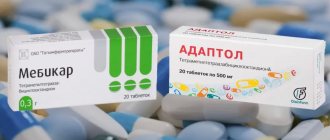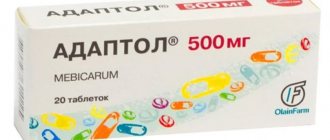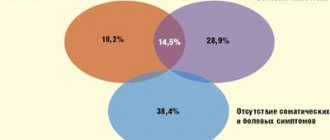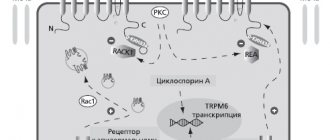Updated: 04/23/2021 15:13:41
Expert: Abramova Tsilya
We present to your attention two anxiolytic drugs - Mebicar and Adaptol. The same composition, dosage, principle of action and indications - what is the difference between them? Both drugs are prescribed in the complex treatment of neuroses, cardiac diseases, addiction to tobacco and in other situations to relieve fear and anxiety. At first glance, the drugs differ only in price, and Mebikar, as a cheaper drug, is the winner. But is it really that simple?
The experts of our magazine collected data on the drugs in question and found out that Adaptol is considered an original drug, while Mebicar is a generic. The original has undergone clinical trials and has established itself as a medicine effective in the treatment of various neurological conditions. The generic differs in its auxiliary components and, theoretically, its effectiveness may be lower.
Studies have shown that both drugs cope with the task and are equally often used in practice. It is safe to say that in this case, the generic Mebicar is practically not inferior to the original Adaptol and can successfully compete with it in the pharmaceutical market.
Composition and release form: is there a difference?
The main active ingredient is the same for Adaptol and Mebicar - tetramethyltetraazabicyclooctanedione. The drugs in question differ in their auxiliary components. Mebicar additionally contains povidone and calcium stearate, Adaptol contains the same calcium stearate and methylcellulose.
Both drugs belong to the same pharmacological group. These are anxiolytics, they are also tranquilizers - drugs that relieve anxiety and fear. They are used in practical psychiatry and neurology, and are used in therapy for the complex treatment of certain diseases.
Mebicar and Adaptol are available in tablets. The dosage of the drug differs:
- Adaptol is presented on the pharmaceutical market in the form of 500 mg tablets.
- Mebicar is available in tablets of 300 and 500 mg.
The cost of drugs varies:
- Adaptol - about 600 rubles for 20 pieces.
- Mebicar - about 400 rubles for 20 pieces.
Mebicar is one and a half times cheaper, which determines its popularity. But let's find out whether the price of the more expensive option - Adaptol - is justified, and whether it is worth saving in this case.
How do they work?
The instructions for use state that tetramethyltetraazabicyclooctanedione in Adaptol and Mebicar acts on various tissues:
- enhances oxygen supply to the myocardium;
- improves blood flow in the heart muscle;
- normalizes the balance of electrolytes in the blood;
- activates protein synthesis;
- increases the energy resource of the cell.
The active substance of both drugs is similar in structure to natural metabolites of the human body. It affects the functioning of the hypothalamus and the main neurotransmitter systems. The drugs under study are involved in the synthesis of choline, serotonin and adrenaline. When applied as a course, the following effects are expected:
- anxiety and restlessness go away;
- the feeling of fear decreases;
- emotional stress decreases;
- Cognitive functions improve: attention, memory.
Adaptol and Mebicar do not reduce mental and motor activity, so they can be prescribed during the day (including during school and work). They do not cause drowsiness, but improve the natural flow of sleep if it is disturbed. They do not lead to the development of euphoria and do not affect mood. Ease nicotine addiction.
Introduction
Autonomic dysfunction is a common syndrome characterized by a wide range of multisystem autonomic disorders, often combined with anxiety. In these cases, patient complaints of decreased memory, attention, and thought processes, which impede professional and social activities, are obligatory. In this regard, when choosing a drug for the treatment of anxiety-associated autonomic dysfunction, it is necessary to take into account, in particular, its effect on cognitive functions.
Many of the psychotropic drugs used to treat anxiety relieve vegetative symptoms well, but can aggravate cognitive impairment, which reduces the patient’s satisfaction with the treatment effect, increasing his maladjustment. In this regard, it is important to use drugs that do not have anticholinergic and muscle relaxant effects. These requirements are met by the drug mebicar, a synthetic compound (a derivative of bicyclic biureas) with tranquilizing ability [1]. Mebicar reduces feelings of anxiety, restlessness, reduces irritability, and has a mild sedative effect. The targets for the action of mebikar are the structures included in the limbic-reticular complex and the emotional zones of the hypothalamus. The wide range of pharmacological effects of mebicar is explained by its integrative effect on the serotonin, adrenergic, cholinergic and GABAergic systems. Along with the main stress-protective and anxiolytic effect, the drug has a pronounced nootropic effect: improves memory, mental functions, increases logic, coherence and speed of thinking, improves attention and mental performance, helps normalize mental functions in general under conditions of stress and overload. Mebicar does not have a muscle relaxant effect and does not impair coordination, which significantly distinguishes it from benzodiazepine tranquilizers [1-5]. Mebicar improves the quality of sleep, facilitating the process of falling asleep, normalizes sleep structure and reduces the frequency of anxious dreams, without having a direct hypnotic effect and without causing daytime drowsiness, which allowed the drug to be classified as a “daytime” tranquilizer. In combination with other psychotropic and hypnotic drugs, Mebicar enhances the hypnotic effect. Additional effects of mebicar are its modulating effect on lipid metabolism, due to the ability to change the ratio of high and low density lipoproteins, which helps reduce the concentration of cholesterol in the blood [6], as well as the ability to improve myocardial trophism by increasing coronary blood flow, reducing blood viscosity and intravascular aggregation erythrocytes [7, 8]. Mebicar does not cause euphoria or addiction. All this justifies the possibility of its use in various fields of medicine, including neurology.
The purpose of the study was to study the effectiveness of Mebikar in patients with autonomic dysfunction combined with anxiety disorder.
Hypothesis: Mebicar, while effectively eliminating symptoms of mild to moderate anxiety and autonomic disorders in patients with autonomic dysfunction, should not have a negative effect on cognitive function.
Assessing the effectiveness of drugs
Controversy among doctors continues regarding Adaptol and Mebicar. Old-school specialists say that these drugs have proven their effectiveness in clinical practice. Neurologists and psychiatrists prescribe these drugs - and see their positive effects. The beneficial effects of medications are confirmed by clinical trials:
- Mebicar has proven itself in the treatment of anxiety disorders associated with autonomic dysfunction. Studies have shown that the drug relieves feelings of anxiety and fear without causing drowsiness or reducing memory and attention.
- Adaptol has been used in complex therapy of irritable bowel syndrome. The effect was noticeable already in the second week of taking the drug. The study authors especially emphasized the fact that Adaptol reduces anxiety and eliminates autonomic disorders without causing significant side effects.
- Both drugs are successfully used in neurological and psychiatric practice, in dermatology, which is confirmed by numerous scientific works.
- There are many similar examples, and these drugs are popular in Russia and the former CIS countries. But what do foreign colleagues say about this? A review of Cochrane studies did not provide information on the effectiveness of Adaptol (Mebicar). There is only data on not very large-scale studies that showed the beneficial effects of Adaptol, but you can’t focus on them alone. The sample is too small to seriously talk about the effectiveness of the drug.
- Some sources refer to Adaptol and its analogues as “fuflomycins,” emphasizing the fact that these drugs have not undergone randomized clinical trials. According to the position of evidence-based medicine, such drugs cannot be used in the practice of a modern doctor.
Material and methods
The study included 54 patients: 39 women (mean age 25±6.7 years) and 15 men (mean age 27±8.4 years).
Inclusion criteria
were as follows: age from 18 to 55 years, patients of both sexes with a diagnosis of autonomic dysfunction syndrome (ADS) and different types of anxiety disorder (generalized anxiety disorder, panic disorder, adjustment disorder) with manifestations of mild or moderate anxiety.
Exclusion criteria
were: age younger than 18 or older than 55 years; diagnoses of obsessive-compulsive, phobic disorder; severe anxiety (46 points or more on the Spielberger-Hanin scale); the presence of depression, dementia, as well as severe somatic diseases.
In all cases, patients were examined, including collection of complaints, medical history, somatic and neurological examinations.
The type of anxiety disorder was determined according to ICD-10 criteria. The severity of anxiety was assessed using the Spielberger-Hanin scale [9]. ICD-10 clinical criteria and the Hospital Anxiety and Depression Scale (HADS) were used to exclude depression.
In order to assess the initial autonomic tone (the state of autonomic indicators during the period of relaxed wakefulness), a questionnaire was used to identify signs of autonomic changes, filled out by the subject, and a chart to identify signs of autonomic disorders, filled out by the researcher (see Appendix).
Autonomic symptoms are systematized into groups: cardiovascular, respiratory, gastrointestinal, muscular-tonic and motor. The presence of sleep disorders, asthenic symptom complex, and neuroendocrine disorders were taken into account.
The state of cognitive functions was assessed using the following tests: 16-word learning test FCSRT-IR [10], MoCA test [11], McNair memory self-assessment questionnaire [12]. The diagnosis of mild cognitive impairment (MCI) was made according to the NIA-AA criteria [13]. To exclude dementia, ICD-10 criteria and the Lowton-Brody Questionnaire for Assessing Daily Activities (1969) were used, which we present in full, since it is not known to all doctors (see Appendix).
Mebicar was prescribed at a dose of 300 mg 2 times a day for 3 months.
Adverse effects were assessed using the Udvalg for Kliniske Undersogelser Scale (UKU) (see Appendix).
The results were processed by the statistical method of paired comparison of patient groups using Microsoft Excel 7.0 and Statistica application programs. In case of normal distribution, comparative analysis between groups was carried out using Student's t test. Differences were considered significant at p
<0.05. The mean and standard deviation, as well as the error of the mean, were calculated. In the absence of normal distribution, medians, 1st and 3rd quartiles were calculated. Comparisons between groups were made using the Mann-Whitney test.
Indications for use
Indications for Mebicar and Adaptol are similar:
- neurotic disorders: anxiety, phobia, depression, emotional lability, etc.;
- complex therapy for cardialgia (heart pain), coronary heart disease;
- recovery after myocardial infarction;
- addiction to tobacco – to reduce craving for nicotine;
- when prescribing antipsychotics and tranquilizers - to improve their tolerability.
- Indications for therapy are determined by the doctor after examination.
How are they transferred?
Experience shows that anxiolytics are well tolerated and side effects are rare. The following conditions may occur:
- allergic reaction such as skin itching and rash;
- decreased blood pressure;
- increased body temperature;
- nausea, abdominal discomfort.
These reactions are not a reason to stop therapy. Usually blood pressure and body temperature return to normal on their own. Only if an allergic rash and abdominal pain appears should you stop taking the drug and consult a doctor.
During treatment there is no addiction. Cancellation is well tolerated and no dosage adjustment is required.
MEBIKAR (tablets)
I have no strength.
Anyone who doesn't know what it is will never understand. Everywhere you look, everything is bad, the condition is deteriorating rapidly, and here - like a demo version of a good life - a few days of enlightenment (like, look how well you can live). At one time I took antidepressants for a long time. Most of all, I am “driven” by children - usually after something bad - illness, trouble. When something happens, I am as collected as possible, but after that I am completely distraught. I will never take antidepressants again - they don’t make me feel like a zombie. But something needs to be saved. First there was Adaptol, but it was expensive, so I decided to try the same active ingredient in a different form. I found Mebicar. Also expensive, not cheaper than adaptol. Removes neuroses, improves sleep. But the effect is only while taking it; as soon as you stop, the condition worsens again. I am adding to the review on September 14, 2018, because something has changed in my attitude towards the drug. In general, judge for yourself. In July, we had a misfortune - a child was admitted to the hospital in an urgent condition. I won’t say what happened and what the diagnosis is, but the condition is serious and threatens long-term treatment without prognosis...
I have one peculiarity: when something happens, I “hold on” for several days, and then I begin to slowly and surely “fall apart” - it hits me. This time something similar happened - it started to get worse and I realized that I couldn’t cope on my own - I started taking Mebicar, fortunately at that moment I had a package of the drug, the dosage was 500. But in vain. It was probably necessary to divide the drug in two. And instead of helping, the drug began to have a negative effect (although it would be wrong to say here - after all, it is possible that the drug did not work at all, and I felt bad under the influence of circumstances). The despair was so strong, and the horror of what happened intensified every day (but they say that time heals...) I can say that I have probably never felt so bad. In 1 month I lost 5 kg, constant incessant trembling, I was like a walking exposed nerve - I reacted sharply to sounds (I even jumped at a rustle, and if someone unexpectedly approached, I screamed), I absolutely could not sleep - I woke up in the middle of the night and didn't sleep anymore. At first she could at least cry in order to “throw out” the negativity, but after some time she could no longer cry. After 10 days, the child was discharged from the hospital - I needed to prepare, support him, and show unquenchable optimism. What good could I “show” in such a state? All thoughts went so negative at that time that every word spoken reminded of the situation, nothing could distract, the critical attitude towards the situation was completely lost - EVERYTHING was bad, absolutely everything! A new symptom was added - I constantly began to monitor my son’s condition, expecting it to worsen. but he is a teenager! He needs to be let go of himself so that he grows up normal and does not consider himself defective. When he went for a walk, the soil ran away from under his feet, returning only when he arrived.
In general, I think the picture is clear. Everything was aggravated by the fact that I don’t work. If I could go away, it would be easier for me, but constantly being at home and “spying” on the child deepened my despair. I simply could not leave the house - I was afraid to leave the child and could not find a sufficiently serious reason for excommunication.
And all this happened while taking the same dose - Mebicar 500. And the most popular advice to “pull yourself together” was especially annoying - how can you pull yourself together when the will is paralyzed? Attempts to gather “in a small group” did not bring results, once again reminding us of the hopelessness of the situation.
It helped a little that my husband took the children for 3 days and went to visit his mother in another region, and at that time I stopped taking Mebicar. I just gave up and that's it. At the same time, the need for constant monitoring of the child disappeared - and I began to come to life, so it’s hard to say what helped. A few days earlier, my mother went to see a neurologist (for her diagnosis) and told her about my condition. The neurologist said that perhaps the dosage of Mebicar was too high or that it was simply not suitable for me and prescribed another drug for a month. I decided that if it got worse, I would start taking it, but I didn’t have to. I can’t say that I immediately returned to normal, but there was no deterioration in my condition.
I'm not taking anything now. Life goes on as usual, I worry about the child, but it’s not as acute and I don’t have that feeling of hopelessness, although I don’t have excessive optimism about my son’s illness.
This is the story. Therefore, I don’t know what to say about this drug now. Perhaps this is just a lifeline for those who are still not so bad, or maybe the dosage that turned out to be unnecessary aggravated the situation?
Precautionary measures
Adaptol and Mebicar are not prescribed in the following situations:
- pregnancy;
- lactation period;
- children under 18 years of age;
- individual intolerance to the drug.
The drugs are low-toxic, and overdose is unlikely. Exceeding the dosage can lead to a sharp decrease in blood pressure, weakness and attacks of dizziness. When such symptoms appear, gastric lavage is indicated.











